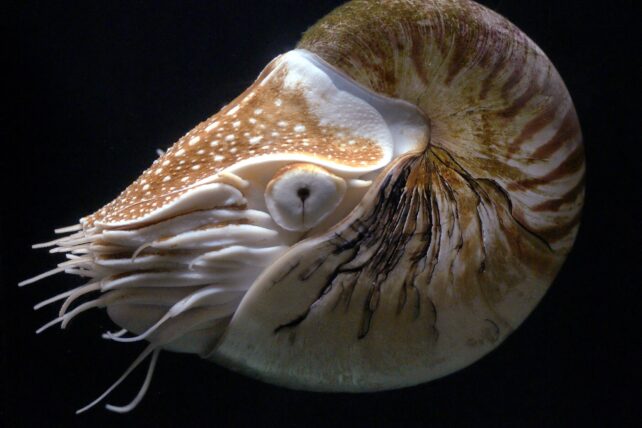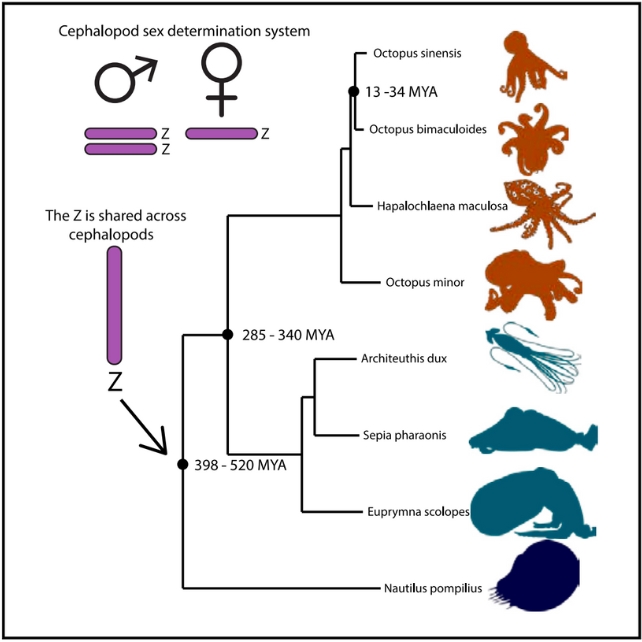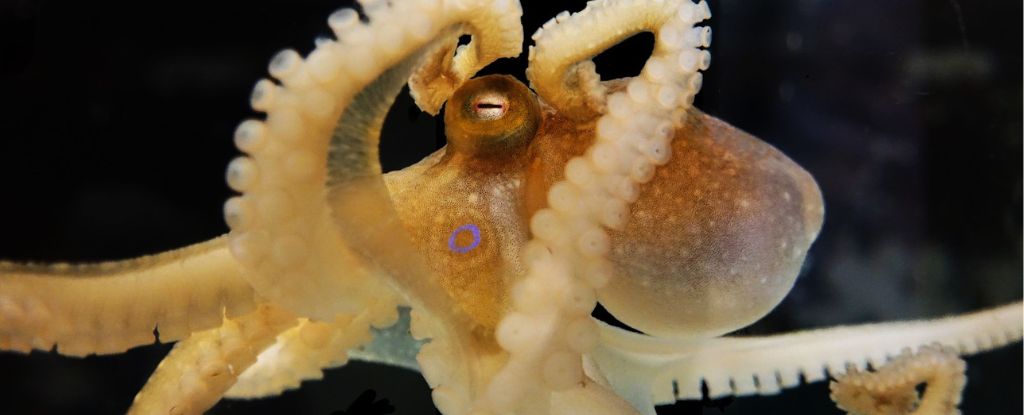Cephalopods may have the oldest sex chromosomes of any animal, according to a new discovery in the octopus genome.
That’s a big deal given that scientists didn’t know until now if these oddball creatures even had a form of sex determination written into their genes.
At last, researchers at the University of Oregon appear to have solved the mystery.
Their peer-reviewed study provides the first evidence of genetic sex determination among cephalopods, tracing the sex chromosome’s origin to over 480 million years ago.
To determine if an octopus is male or female, biologists have previously relied purely on observation, differentiating between which individuals lay eggs versus which produce sperm.
Searching the octopus genome had shown no clear sign of a sex chromosome system. Scientists were beginning to wonder if perhaps cephalopods were like some fish and reptiles, with sex determined through environmental factors such as the temperature at which eggs are kept rather than the inheritance of distinct chromosomes.
Examining the genes of the California two-spot octopus (Octopus bimaculoides) – the first cephalopod to have its whole genome sequenced – researchers have finally found a unique chromosome pair.
They discovered it on chromosome number 17, and it only stood out to researchers when they compared the male octopus genome that had been fully sequenced to a female one. The female octopus seemed to be missing one of the two copies.
“This particular chromosome had half the amount of sequencing data, which indicated there was only one copy,” says Gabrielle Coffing, a PhD candidate in biology and first author of the new study.
“Then as we explored that more, we reached the conclusion that we must have stumbled upon a sex chromosome.”
We humans rely on an XY system, wherein two X chromosomes create the default female body plan, while the presence of a Y chromosome generally triggers the development of male characteristics.
Octopuses have an opposite system. It is the males that typically have a double-Z pair and females that have only one Z chromosome.
To see if this system was present in other cephalopods, researchers compared the genomes of three octopus species, three squid species, and a nautilus.
They concluded that the cephalopod Z chromosome is “a genomic outlier” that has “a single, ancient origin”.
The genomes of two squid species and the East Asian common octopus (Octopus sinensis) had similar outlier signatures, but because these creatures are from different lineages, it suggests the Z chromosome originated before their split.
After further investigation, Coffing and team discovered evidence for the Z chromosome in the chambered nautilus (Nautilus pompilius). N. pompilius separated from the octopus as far back as 520–398 million years ago, with recent research placing this split at about 482 million years ago.

As such, researchers at the University of Oregon argue that the Z chromosome “had to have originated at least this long ago”.
This means the octopus could have the oldest animal sex chromosome yet found, beating even some insects which are thought to have sex chromosomes that date back 450 million years.
Compared to those of octopuses, however, these arthropod sex chromosomes are poorly conserved across species.

For comparisons, the oldest accepted vertebrate chromosome is that of a sturgeon fish, which is thought to be about 180 million years old. Sturgeon fish females have a ZW sex chromosome set pair as opposed to the female octopus’s ‘hemizygous’ Z chromosome.
The ZW sex-determination system is seen in birds, crustaceans, and some insects.
It’s possible the octopus’s corresponding W chromosome may have been lost over time in a manner similar to the ill-fated trajectory of the Y chromosome in humans.
The story behind sex chromosomes has changed a lot in recent years. Once, they were thought to be intrinsic features of sex determination in animals. But biological research tends to be biased towards mammals.
As it turns out, some fish and reptiles, like crocodiles, don’t have sex chromosomes at all. The sex of their offspring is instead determined by other, external factors through epigenetic regulations.
Clearly, there is still much to be learned about how sex chromosomes evolved, and why. Octopuses, with their deep evolutionary roots could be fascinating models for future research.
“Cephalopods are already such interesting creatures, and there are so many things we’re still learning about them, especially in neuroscience,” Coffing says.
“This is just showing one more interesting thing about them: They have really ancient sex chromosomes.”
The research is published in Current Biology.
An earlier version of this article was published in March 2024 before the research was peer-reviewed.





